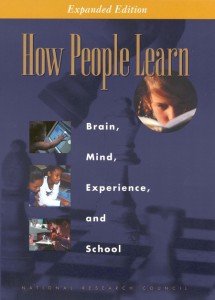As I have just started teaching and online summer course ETEC 533, I decided to re-read the book that has been serving as a key reading (one might say the backbone) to the entire course: How People Learn: Brain, Mind, Experience and School. I love it as it is directed to educators who want to implement the results of education research into their practice. To me a good book is a book that every time you read it, you find something new for yourself. This time, I focused on adaptive expertise. I was thinking of it in the context of teacher education. Here is a quote from the book (p. 45):
An important question for educators is whether some ways of organizing knowledge are better at helping people remain flexible and adaptive to new situations than others. For example, contrast two types of Japanese sushi experts (Hatano and Inagaki, 1986): one excels at following a fixed recipe; the other has “adaptive expertise” and is able to prepare sushi quite creatively. These appear to be examples of two very different types of expertise, one that is relatively routinized and one that is flexible and more adaptable to external demands: experts have been characterized as being “merely skilled” versus “highly competent” or more colorfully as “artisans” versus “virtuosos” (Miller, 1978). These differences apparently exist across a wide range of jobs. (p. 45)
Beliefs about what it means to be an expert can affect the degree to which people explicitly search for what they don’t know and take steps to improve the situation. In a study of researchers and veteran teachers, a common assumption was that “an expert is someone who knows all the answers” (Cognition and Technology Group at Vanderbilt, 1997). This assumption had been implicit rather than explicit and had never been questioned and discussed. But when the researchers and teachers discussed this concept, they discovered that it placed severe constraints on new learning because the tendency was to worry about looking competent rather than
publicly acknowledging the need for help in certain areas (see Dweck, 1989, for similar findings with students). The researchers and the teachers found it useful to replace their previous model of “answer-filled experts” with the model of “accomplished novices.” Accomplished novices are skilled in many areas and proud of their accomplishments, but they realize that what they know is minuscule compared to all that is potentially knowable. This model helps free people to continue to learn even though they may have spent 10 to 20 years as an “expert” in their field (p.48)
What struck me about it is a clear difference between artisans and virtuosos and how your beliefs about what it means to be an expert will open or close doors for future growth. Of course one might not expect every teacher to become a virtuoso, but we, teacher educators, would like to make sure that at least the teachers who graduate from our programs are artisans and have opportunities and willingness to become virtuosos.

